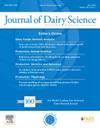奶牛产犊间隔对后代发育、新陈代谢和产奶性能的影响
IF 3.7
1区 农林科学
Q1 AGRICULTURE, DAIRY & ANIMAL SCIENCE
引用次数: 0
摘要
延长奶牛人工授精的自愿等待期(VWP)对减少产犊事件的发生频率和在生育问题较少的时刻进行人工授精很有意义。人们对不同VWP和不同产犊间隔(CInt)的母牛所产犊牛的情况知之甚少。本研究的目的是确定母牛的产犊间隔(CInt)对其后代从出生到第一次泌乳的 100 DIM 期间的体况、代谢状况和产奶量的影响。荷斯坦弗里斯兰奶牛(n = 154,初产41头,多产113头)根据母牛的胎次、产奶量和体细胞数(SCC)进行分群,并随机分配到50、125或200 d的VWP。某些母牛在计划的 VWP 结束后不久未能成功受精,导致计划的 VWP 与实际的 CInt 存在差异。犊牛根据其母体的实际 CInt 重新分组(CInt_1:324 - 408 d;CInt_2:409 - 468 d;CInt_3:469 - 586 d)。母牛的 CInt 不会影响犊牛的出生体重。从出生到断奶,CInt_1(0.34 mmol/L(置信区间(CI):0.30,0.37))母体所生犊牛的血浆非酯化脂肪酸(NEFA)浓度高于 CInt_2(0.28 mmol/L(CI:0.26,0.31))和 CInt_3(0.26 mmol/L(CI:0.24,0.29))母体所生犊牛。断奶前,CInt(CInt_1)较短的母体所产犊牛对匙孔虫血蓝蛋白(KLH)的 IgG 和 IgM(IgG:6.05 ± 0.30 vs. 4.64 ± 0.30;IgM:6.45 ± 0.17 vs. 5.89 ± 0.16,分别)高于 CInt_3。断奶后到产犊前,CInt_1-犊牛的血浆 NEFA 浓度往往高于 CInt_3-犊牛。与母牛较短的CInt(CInt_1)相比,母牛较长的CInt会导致后代血浆IGF_1(CInt_2)、牛奶乳糖(CInt_3)以及脂肪和蛋白质校正牛奶(FPCM)(CInt_2)较低。总之,母畜较长的 CInt 不会影响犊牛的出生体重,也不会影响断奶或饲养阶段的体重。从出生到断奶,母牛的 CInt 越长,犊牛血浆中抗 KLH 的 IgG 和血浆中 NEFA 的浓度就越低。在后代的第一次哺乳期,母牛较长的 CInt 会导致前 100 DIM 期间血浆 IGF_1 和 FPCM 降低,尽管并非所有 CInt 类别都有影响。本文章由计算机程序翻译,如有差异,请以英文原文为准。
Effects of calving interval of dairy cows on development, metabolism, and milk performance of their offspring
Extending the voluntary waiting period (VWP) for insemination in dairy cows is of interest as a strategy to reduce the frequency of calving events and inseminate at a moment with fewer fertility problems. Little is known about the calves born from dams with a different VWP followed by a different calving interval (CInt). The objective of the current study was to identify the effect of dam's CInt on body condition, metabolic status, and milk production of their offspring from birth until 100 DIM of the offspring's first lactation. Holstein-Friesian dairy cows (n = 154, 41 primiparous, 113 multiparous) were blocked according to parity, milk yield, and SCC and randomly assigned to a VWP of 50, 125, or 200 d. Female calves (n = 62) from cows with different CInt were monitored from birth until their first calving event as heifer. Certain dams were not successfully inseminated soon after the planned VWP, resulting in differences between the intended VWP and the actual CInt. Calves were regrouped according to their dam's actual CInt (CInt_1: 324–408 d; CInt_2: 409–468 d; CInt_3: 469–586 d). The dam's CInt did not affect calf birth weight. From birth to weaning, the calves born to dams in CInt_1 had a higher plasma nonesterified fatty acids (NEFA) concentration (0.34 mmol/L; CI: 0.30, 0.37) than CInt_2 (0.28 mmol/L; CI: 0.26, 0.31) and CInt_3 (0.26 mmol/L; CI: 0.24, 0.29) calves. Calves born to dams with a shorter CInt (CInt_1) had greater IgG and IgM against keyhole limpet hemocyanin (KLH) than CInt_3 (IgG: 6.05 ± 0.30 vs. 4.64 ± 0.30; IgM: 6.45 ± 0.17 vs. 5.89 ± 0.16, respectively; mean ± SE) before weaning. After weaning till calving, CInt_1 calves tended to have greater plasma NEFA concentration than CInt_3-calves. During the first 100 DIM, a longer CInt of the dams resulted in lower plasma IGF_1 (CInt_2), lower milk lactose (CInt_3), and lower fat- and protein-corrected milk (FPCM; CInt_2) in offspring, compared with shorter CInt of the dams (CInt_1). Collectively, a longer CInt in dams did not affect birth weight of their calves or BW during the weaning or rearing phase. From birth till weaning, a longer CInt in dams resulted in less anti-KLH IgG and lower plasma NEFA concentration in plasma of the calves. During the first lactation of their offspring, a longer CInt in dams can result in a lower plasma IGF_1 and FPCM during the first 100 DIM, although effects were not present in all CInt categories.
求助全文
通过发布文献求助,成功后即可免费获取论文全文。
去求助
来源期刊

Journal of Dairy Science
农林科学-奶制品与动物科学
CiteScore
7.90
自引率
17.10%
发文量
784
审稿时长
4.2 months
期刊介绍:
The official journal of the American Dairy Science Association®, Journal of Dairy Science® (JDS) is the leading peer-reviewed general dairy research journal in the world. JDS readers represent education, industry, and government agencies in more than 70 countries with interests in biochemistry, breeding, economics, engineering, environment, food science, genetics, microbiology, nutrition, pathology, physiology, processing, public health, quality assurance, and sanitation.
 求助内容:
求助内容: 应助结果提醒方式:
应助结果提醒方式:


